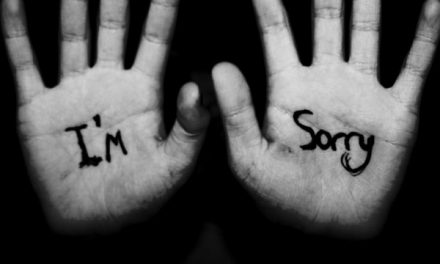By Deb Avery
I begin to notice movement and a shape in the darkness.
It’s frightening—as if falling into the abyss isn’t enough, I’m no longer alone in this dismal, dark place. Terror and despair compete against each other in the forefront of my mind. Then, a strange thing happens. The shape draws nearer, and it begins to seem less sinister. The sound I mistook as ominous is merely the sound of the hoarseness in the tiny voice, caused from calling for help for so long and being ignored.
Something reaches for me through the mist. The terror once again surges forth, but only for a second. For this time I recognize the the shape of a small arm and hand. I reach out nervously and take the hand gently into what faint light there is around us. As I look up into its face, tears fill my eyes. This horror, this thing that I was so frightened of, is nothing more than my child self—hurting, crying, lonely and afraid.
My last battle with depression.
A depression so deep and dark, I feared I could not find my way out of it. Instead, I found not only myself, but a renewed love of life, and a pathway out. What happened that was so different from the other times? And what is this depression that I speak of in the first place? Let me backtrack a little, if I may, and answer that second question: What is depression?
Depression is a much misunderstood condition. Ask four people in a room and each response will be different, personal. Some people think depression is being sad, unhappy and blue. Others will say it’s all in ours heads and to stop wallowing in self pity and pull ourselves up by the bootstraps. Still, others will explain it’s a mental illness and talking with a psychiatrist/taking medications will help with recovery.
Very few will come close to the truth of this life changing event that many of us have endured.
First of all, look at the way we talk today: “I am so depressed! I’m just going to die. Nathan did not ask me to the dance and I’m just devastated!” Or, “I didn’t get that promotion. I’m so depressed! I’m just devastated!” How about this one, “I’ve gained five pounds! I’m so depressed I want to die!”
Sound a little familiar? It should. We hear these all the time. We have replaced the words “I’m so sad” with the words, “I’m depressed” and “I’m devastated.”
One who has truly known the depths of depression and true devastation knows that it is so much more than simply being sad.
True depression, on the other hand, is a deep, overwhelming feeling of despondency. It robs us of hope and the joy of everyday life as it bombards us with feelings of unworthiness and self-hate. It’s the difference between night and day from the typical sad feelings that we all get from time to time. The feelings of despair can be life threatening. We don’t have to look far to see this all around us.
One of my favorite people, Robin Williams, suffered with depression for many years. He used his humor and good nature as a mask. He used it well. Sadly, he lost his battle in the abyss. All the masks in the world cannot change what is inside. He was a person of depth, compassion and empathy; he is missed terribly.
I have suffered from depression for many years. It began when I was in my teens, or at least that is the first time I was told I was depressed. I think it may have been with me all along. As a child I was the quiet one, the different one. My grandmother once told me that I was such a quiet child that one could forget I was even around.
But my mind was not quiet.
An avid imagination, love, compassion and empathy flowed through my veins and through my thoughts. I was so empathetic that I could walk into a room and tell you immediately who was sad, happy, angry, or anything in between. I felt the feelings of others just as I would my own. Not only was that limited to the humans around me, I felt the feelings of animals, trees, all of nature, just as easily. I thought everyone did.
I was in for a rude awakening.
It occurred when I began school and has continued throughout most of my life. I walked in to my first day of school and felt, quiet literally, all the feelings around me. I was in tears most of the day. Everyone thought it was just first day jitters, missing home and such, but it went way deeper; I was picking up the emotions of everyone around me—it was normal first day jitters multiplied by 20. I was labeled sensitive and over-emotional. There were no counselors at that time in rural schools. I was told basically to toughen up and get over it. Kids, and adults, took advantage of my kind nature. Boys especially could be cruel and overbearing. This problem only grew worse as I grew up, and even played a part in my relationships as an adult.
There was also the problem of my connection to animals and nature. Remember, this was rural America, and in the South. Most people had farms which included animals. These animals were not pets; they were slaughtered for food. They were not always treated properly, and I was able to feel this. This was devastating to me.
Later, through my love of reading, and many years later through connecting with people who were like-minded and understood, I came to realize that I was not that different after all. I even found out there were many people like myself who had the emphatic ability to sense others—all species—emotions and the world around them. I, and many others, know that this is an innate ability that lies in each of us, though it is more developed in some than others. It’s just a matter of letting it develop properly.
I have embraced the life of feeling.
I have also learned to act as a sieve and let the feelings and emotions pass right on through without much residue. It wasn’t easy. It took courage, belief in myself, and many hours spent in the abyss, but I am so grateful for my journey.
My life changed when I first learned of the teachings of Thich Nhat Hahn. I devoured every book I could find on the Zen path in life. However, books alone do not cure a lifetime of wounds and scars. Only when I put what I had read into practice, learned meditation and how to sit with my feelings, only then did I begin to see positive changes in my life. I wish I could say I never get depressed any longer, but at times, I still do. However, the difference is that it’s not as severe, doesn’t last as long and I recover much faster.
Acceptance is the first obstacle to many things in life. Depression is no different. Until we accept that it’s OK to be depressed, OK to have these feelings, then, and only then, can we begin to work on those feelings and eventually heal the many wounds that are deep within us.
After I learned to accept myself—scars and all, differences and all—the rest was putting what I had learned into practice.
Please, never let anyone tell you there is only one way to deal with this depression. There are many. So what if we need medication. That’s not a failure as some would lead us to believe. Sometimes, we must mix modern remedies with ancient insight. Only we know what feels right deep within.
It takes work, practice, more patience and a lot of self-compassion, but we can overcome some, perhaps all, of the more debilitating aspects of life long depression. We can live a full and happy, life. Don’t give up on yourself. Don’t give in to despair. There is help. Be brave, have faith, have courage, take the hand of your child self, the one crying out for love and help, and never let go. Hold it closely and gently, tenderly, soothe its fears, its tears, and help it heal through love and compassion.
Deb Avery lives in the Southern United States with her animals, surrounded by mighty oaks and woodlands. All of Nature is her friend and teacher. She is an avid gardener, reader of books, lover of all beings and also has been referred to as a “bit of a weird one,” which she takes as a compliment. Having lived in many diverse places, including several years abroad, she has learned first hand that deep inside we are all one and the same. She takes long walks in the woods with her dog, Sam, and enjoys yoga and meditation. Her main reason for writing is to reach out to others and hopefully help them realize that they are not weird, different or alone.
Photo: Leopard Print/flickr
Editor: Alicia Wozniak
Comments
- Mom, Zen and Me - March 15, 2021
- Finding The Zen in the Pagan Roots of Halloween - October 31, 2019
- When Words Fail Me - July 18, 2019





